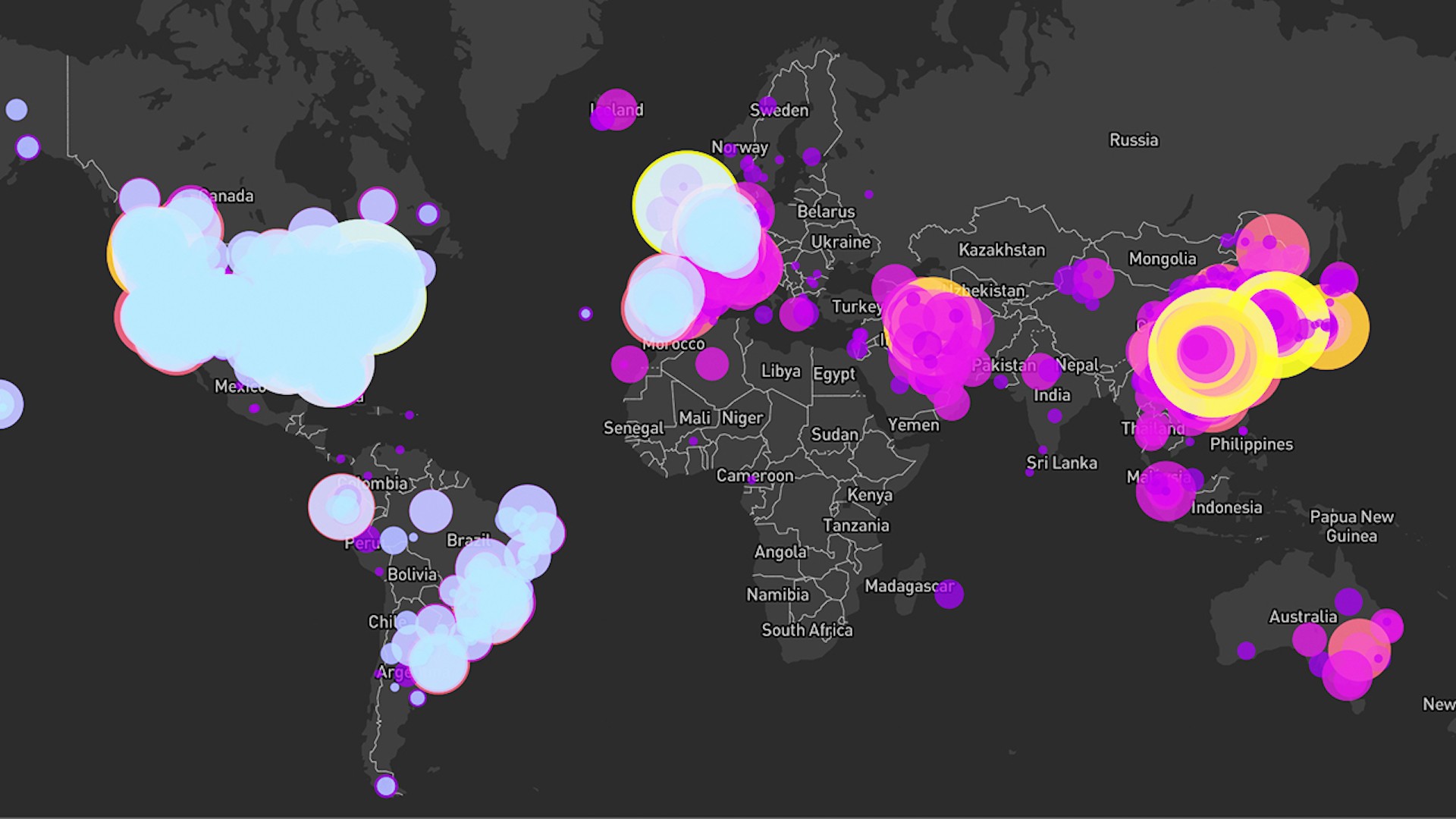Before the Canadian government announced billions of dollars in aid to address the coronavirus pandemic, Vancouver neighbours were already hatching plans to help each other on a smaller, more immediate timeline.
On Friday, March 13, Avery Shannon was on a seven-hour phone call with friends and colleagues talking about how to encourage the opposite of toilet paper hoarding. The goal was to let neighbours connect, share, and show solidarity in whatever ways they knew how.
Advertisement
“We knew there was a vital need for something like this in our communities, and we knew that we wanted to have as wide a reach as possible,” Shannon recalled.Though they didn’t know it at the time, that phone call turned into one of Canada’s most prolific grassroots relief efforts, connecting 30,000 Vancouver area residents in one “Coming Together” Facebook group. Similar groups have been popping up across the country in the wake of the coronavirus pandemic, from Toronto’s 20,000-member “caremongering” page to more micro-sized grocery-buying “pods.” Scrolling through the Coming Together page, you can see commenters schedule grocery deliveries, distribute cleaning supplies, give away books or yoga classes, offer do-it-yourself eyeglass adjustment tips, or source a free parking spot near the hospital for a nurse commuting from the suburbs. There are doulas and dog walkers and restaurant workers with trucks all yearning to get in on the feel-good community action.Activists have always done this kind of work in response to natural disasters, but the threat of COVID-19 and related distancing measures have added a new set of obstacles. “We don’t like the term social distancing, because we feel that now is the time more than ever that we need social connections, community, and access to each other,” Shannon said. “Part of our wellbeing is staying connected.”Because of physical distancing, as Canada’s chief medical officer now calls it, this mutual aid work has largely gone unseen. Groceries appear on porches, Lysol wipes are left in mailboxes, and the usual greetings and thank yous are cut from the equation. So VICE sent Vancouver photographer Jackie Dives out to capture what distanced neighbourhood aid looks like.
Scrolling through the Coming Together page, you can see commenters schedule grocery deliveries, distribute cleaning supplies, give away books or yoga classes, offer do-it-yourself eyeglass adjustment tips, or source a free parking spot near the hospital for a nurse commuting from the suburbs. There are doulas and dog walkers and restaurant workers with trucks all yearning to get in on the feel-good community action.Activists have always done this kind of work in response to natural disasters, but the threat of COVID-19 and related distancing measures have added a new set of obstacles. “We don’t like the term social distancing, because we feel that now is the time more than ever that we need social connections, community, and access to each other,” Shannon said. “Part of our wellbeing is staying connected.”Because of physical distancing, as Canada’s chief medical officer now calls it, this mutual aid work has largely gone unseen. Groceries appear on porches, Lysol wipes are left in mailboxes, and the usual greetings and thank yous are cut from the equation. So VICE sent Vancouver photographer Jackie Dives out to capture what distanced neighbourhood aid looks like.

Advertisement
Matthew Kagis is a seasoned mutual aid volunteer who came out of Vancouver's Occupy movement.
Mathew Kagis is a community activist who made local headlines almost a decade ago for reversing an overdose at the Occupy Vancouver tent city. He’s since volunteered his time at an overdose prevention site in Vancouver’s Downtown Eastside, and at anti-pipeline actions on Burnaby Mountain.As soon as he saw the growing Facebook group, Kagis started thinking about new ways to contribute. He thought about the massive weed plant growing in his yard—a high-CBD, low THC strain scored from a cannabis activist. Knowing that folks may be dealing with extra stress, pain, and limited access to medicinal cannabis, he decided to give away what was left of his half-pound haul.Kagis offered eighths to anyone who asked, prioritizing people with chronic pain or anxiety. “I’ve had people who are contacting me for their parents, who are older and not internet savvy and might be embarrassed to ask,” he said. Kagis made 12 stops around East Vancouver last week, delivering baggies of untrimmed bud to faceless strangers’ doors.
Kagis delivered free untrimmed bud to 12 East Vancouver neighbours.
The generosity on the Coming Together page is infectious, but the quality of responses vary depending on the time of day. Some battle in the comments over the effectiveness of homemade masks and hand sanitizer, others raise alarms about sterilizing surfaces and foodborne transmission of the virus.Holding it all together is a team of moderators making sure everyone stays on topic, and nobody gets scammed. “We’re very mindful of making sure best practices are in place, and we’re supporting people to make healthy and wise decisions,” Shannon said. “Since the groups have expanded to vastly, we’ve brought in some more group guidelines.”
Advertisement
Posters must clearly declare an “offer” or “need,” and medical advice is often deleted. Freestyled user-generated aid is by definition not perfect, but seems to fill early gaps while Canadians wait for new government supports to arrive. “All interactions are at your own risk,” a disclaimer on the Coming Together page reads.
Brandy Lien Worrall and her daughter are giving away sourdough starters.
While the pandemic has turned many Instagrammers who can’t leave their homes into bakers, Brandy Lien Worrall, 44, has been living 10 years ahead of this curve. Because of a host of health issues including recovering from a rare breast cancer, she has been isolating to protect her immune system for years, spending many of them honing her breadmaking skills.Instead of buying groceries she wouldn’t be able to deliver herself, Worrall decided to share her Parisian sourdough starter with her neighbours. Within an hour of posting an offer online, Worrall said she received 100 responses from people wishing to make sandwich loaves of their own.With the help of her daughter, Worrall got to work preparing up to 10 starters per day. She said the starter is enough to make bread a few times a week—enough to make a difference in a family food budget.
Isaac Bernard, 11, sold 10 bottles of homemade hand sanitizer for $1 in Mount Pleasant.
Worrall said she takes extra care to sterilize jars and wear a mask when she’s working. She said she prioritizes single moms, older women, and people who are immunocompromised. “It’s been overwhelming but I’m still doing it,” she said. Worrall leaves the starters outside on her porch for pickup. All she asks is that takers leave behind a clean empty jar.
Advertisement
On a smaller scale, Isaac Bernard, 11, set up a folding table on a corner by his Mount Pleasant house to sell hand sanitizer he made from aloe vera, lavender essential oil, and rubbing alcohol. He sold bottles at $1 each, with an aim to donate the money to organizations that help animals.Shaun Olafson and Leanne Atkinson formed the Emergency Relief Society of Vancouver on March 19. With a crew of 41 volunteers, the group delivers medication and groceries around the city for free. According to their website, they’ve made about 100 trips in less than a week.
Shaun Olafson and Leanne Atkinson formed the Emergency Relief Society of Vancouver.
Kagis sees all of this as a continuation of Occupy and similar movements. “People are stepping up, saying I have a skill, I have a thing I can do,” he said. In the case of Occupy, activists were able to leverage the political will built in the tent city to find housing for some of its homeless residents, and put pressure on local government to make policy changes.Though still early in the COVID-19 relief effort, some mutual aid is moving in the same direction. What started as makeshift neighbourhood groups are now growing and going legit. On March 25, the Come Together page announced it’s starting a “survival fund” and launching an app. Toronto’s caremongering group even got a shoutout from Obama.“This pandemic is really highlighting some of the ways that our society is not accessible and not welcoming and not fulfilling the needs of folks who are facing multiple barriers,” Shannon said. “That’s something we really wanted to address, and I think we’re having a good amount of success.”Follow Sarah Berman on Twitter.Follow Jackie Dives on Instagram.

